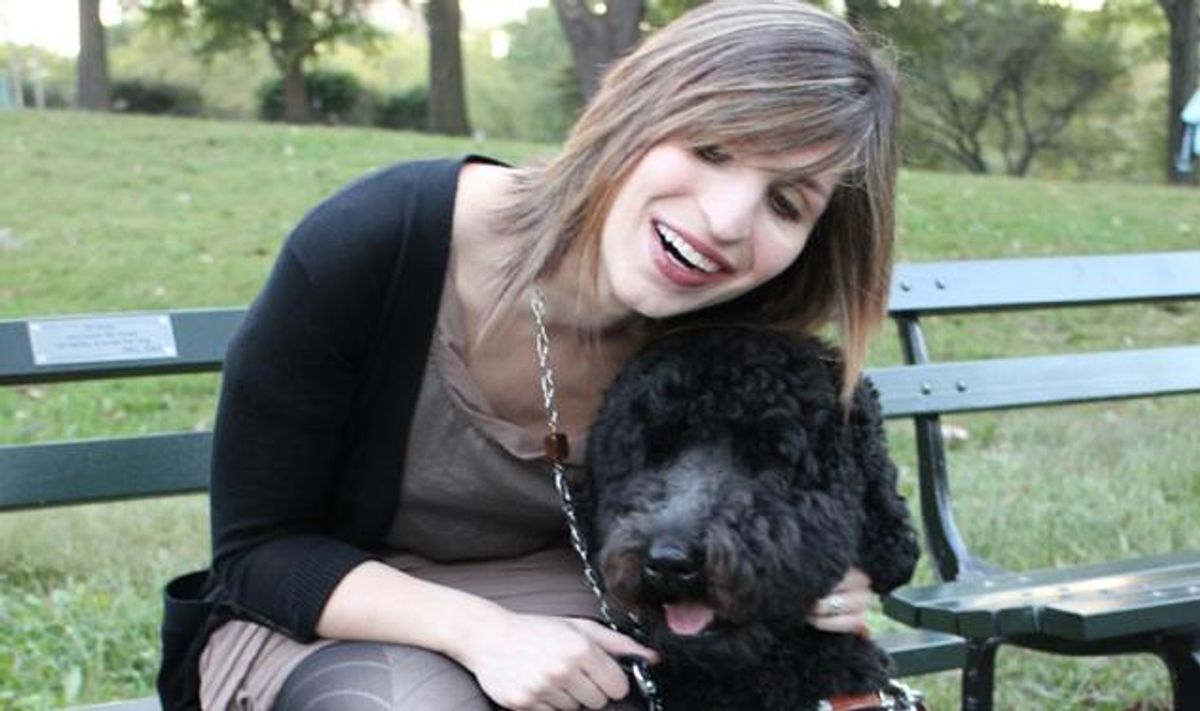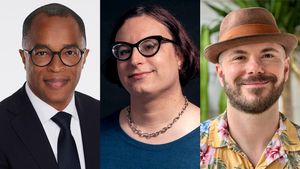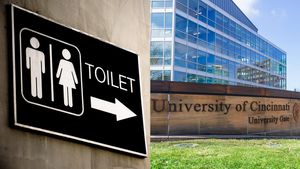Acclaimed mezzo-soprano opera singer Laurie Rubin has been blind since birth, is openly lesbian, and of Jewish background. What better reason to write a memoir? On paper, she was, obviously, not your typical everyday teenager growing up. But with determination and a strong support system, she continually surpassed and redefined others' expectations--both professionally in the music industry and outside of it.
Defying the naysayers since childhood, the lively and charismatic Rubin releases Do You Dream in Color? Insights From a Girl Without Sight this week, recounting her experiences from childhood to full-fledged opera singer. An uplifting story about her journey to follow her dreams, Rubin's story asks those universal questions--"Who am I?" and "Where do I fit in?"--while giving an insight into a musicxal world you probably know nothing about. Not only does she have a busy concert schedule, Rubin is also in developing a curriculum for Yale music (where she earned her masters) that will aim to dispel stereotypes and better the
perceived value of people living with disabilities by allowing people of all ages and walks of life to share in the experiences of blindness. We caught up with her by phone while she was in Hawaii to discuss her phenomenal life story.
Out: Growing up blind, how did you tap into your determination and find the power from within to keep going and continue to your goals?
Laurie Rubin: A lot of it came from just being ingrained in me, because when I was younger my family always supported everything I wanted to do, and they never told me that I shouldn't be able to do something. They encouraged me to do everything from snow skiing to water skiing and river rafting to just going full force into singing. That and my natural feisty personality, I just don't like to be told I can't do something no matter what it is. And I certainly also had enough support beyond family too with teachers, mentors, and friends.
You started your musical aspirations at a very young age. When did you know you wanted to focus on opera and become an opera singer?
When I was younger, 4 and 5, my grandparents would play things from various different operas. They really enjoyed [Edward] Strauss and they would play things from Carmen, and I would imamate the sound of opera because I just naturally gravitated toward it. They were amazed that I wanted to sing like that, so they suggested to my parents that I take voice lessons and as I wasn't a very good piano student. When I was about 11, I went to see Phantom Of The Opera and I was mesmerized by it, and that was when I decided to switch my focus of music to opera shortly after. It kind of snowballed from there. As I got to middle and high school, already different for being blind, the students had a difficult time figuring that they could relate to me; even though I felt that I was a pretty normal kid and the others kids took me at face value and were afraid to become friends with me.
Opera and singing was sort of a way to connect with kids outside of school who were interested in the same things that I was since it didn't really matter that I was blind or what everybody's socioeconomic or culture background was since we all connected because we have this mutual love of music and opera. Because it was such a social force for me, I decided that I really wanted to go into this for the rest of my life.
While finding you passion for music at a young age, did you also realize your sexuality anytime at the stage in your life?
It all started with dreams. When I was 12 years old, I had my first full on lesbian dream and it was really a shock to me and I was scared. My mom told me a lot of kids have that and doesn't mean anything, but then I realized when I was about 16 or 17 it was definitely not just a dream, and I had more dreams and they were more vivid than any kind of dreams I had about being with guys. At that time I was more open to it and excited about the idea because my brother actually came out before me, and I realized that it wasn't so scary to come out [having him as an example]. By the time I got to college, I went to Oberlin which of course is known as a gay Mecca-if you aren't gay when you start at Oberlin you will have some kind of gay experience, I did get into my first relationship with a woman and never turned back.
You've faced hardships in the music industry such as people thinking your partner Jenny is your assistant or helper, and they don't realize she is in fact your partner and a musician herself. How has that been, and has it been changing recently?
It's been difficult for many reasons, because of course I want people to see her as wonderful musician because she is, and in fact she's going to be producing and composing for an album that we are working on together. Also the fact that we are partners, I want people to recognize that too. But I know we [as a nation] have moved forward in terms of acceptance and understanding gay issues, but because certain parts of the country still don't get it, it is a difficulty. A lot of the concerts we do are in those parts of the country, and I think a lot of the time men will assume, even if they know were are together, that we don't take the relationship as seriously as a heterosexual couple because there is still this idea that, unfortunately, people think there is promiscuity within gay relationships, since some are open. [I think] once the book comes out, it will be interesting to see if people do end up changing [how they act and opinions] or are defensive.
Being a lesbian, blind, and Jewish are three distinct traits that some can see as a triple minority, but you strived for success and followed your goals. What was the pivotal moment or reasoning for you to decide to take your story and immortalize it through writing?
When I was in New York, I realized that even though I had this rich life [where I could go water skiing and cook, but] when in the public, most people didn't even realize how independent I was and they actually kind of treated me like a delicate flower. Some of that treatment even led to people being so afraid of me that they wouldn't even hire me for gigs.
I also realized that there is a ridiculous amount of blind people that are not employed, about 70-80%. [While talking out ideas with Jenny and friends,] I realized if there was a really great need to have this story told because people they were curious, educationally for understanding [blind people], and breaking down barriers; and so that is why I started writing. Of course being Jewish was such a big part of my life, and being gay. And I think a lot of times blind or disabled people in general are just decentralized because people assume that they don't embody the same sexuality as people who are "able-bodied" and I really wanted to write about my experiences and relationships because I feel that would open people's minds to the fact that of course I'm still a human being and the only thing that doesn't work is my eyes.
 Have you always been out in your career?
Have you always been out in your career?
I was never really in the closet; I never made a blatant point of talking about it with people because I just would introduce Jenny as my partner and talk about it that way. But when Proposition 8 in Los Angeles was passed, we were so upset and with our chamber music ensemble, we decided to perform a concert called "Love Has No Bounds" of a gay and lesbian composer, and we also did an opera feature from the opera called Patience and Sarah, which was about a lesbian relationship in the 1800s. We ended up giving the proceeds to the Hetrick-Martin Institute because we felt that so many people in LA were fighting for Prop 8 because they said "we have to protect the children," but then we felt like they are not protecting the children, they aren't protecting these gay and lesbian children that are on the street and that is why we ended up giving money to the Institute. So I definitely try to be involved and use my art form to be politically active in the causes I feel are very important.
I read you also opened up a community music school with a summer program in Hawaii where you reside now. How long has it been open and how did you come up selecting to do that?
Yes, [Ohana Arts] is a music festival and school, and we actually have a lot of LGBT youth in our program. It's so great and exciting how free they are about coming out now a days the way they weren't so many years ago, it's really refreshing.
What advice you would tell either your young self going through figuring out your identity or LGBT youth today going through it with the questions of "who am I?" and "where do I fit in?" always fluttering through their minds?
Well, actually, Jenny and I wrote a song about that called "The Girl I Am," and the song is all about no matter how awful you are made to feel or that you feel about yourself in those really awkward times in your life, you have to know that you have to believe in yourself so much that you get through that time. And just remember to always love the person you are because when things seem rocky at those times, it really can only lead you to better times. Those times also build upon compassion so much, you really end up becoming a better person for having gone through that, and you can take that and be kind and helpful to others who are experiencing the same things. Dream big and always pursue your dream, and be resilient to find your place. Never believe the naysayers, only believe your mentors, because those are the people who know who you are, and they are going to help you become the person you are going to want to be because they understand you.
You have upcoming shows in NYC, DC, LA, and the book's release and book tour. What is next for you?
We start off with a tour in San Francisco in January, and we also give concerts in LA, Wyoming, and Idaho. Then for one month going for an artists residency in Saratoga to work on our album, The Girl I Am, and a big national tour the following year. It's a busy fall!
For information about the book, or Rubin's upcoming concerts in New York City (October 25, Barge Music), DC (October 22, Kennedy Center), and LA (November 6, American Jewish University)




 Have you always been out in your career?
Have you always been out in your career?















































































Did 'The White Lotus' waste Lisa's acting debut?